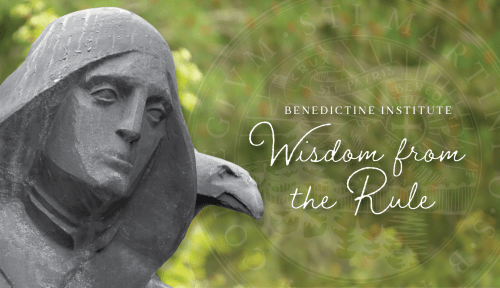Love of Christ & Neighbor – An Oblate Perspective
The Benedictine hallmark of 'Love of Christ and Neighbor' calls us to a radical generosity that offers an alternative to our culture's tendency to overlook the plight of the needy. Imagine walking down the street and seeing someone in need; what do you do? Our culture has largely conditioned us to overlook the plight of the needy, especially those experiencing homelessness. In the United States, generosity towards the needy is often seen as reductive or punitive. As a Benedictine Oblate, I've come to appreciate generous giving, especially when offered in the spirit of 'Love of Christ and Neighbor,' as multiplicative, not reductive.
When I hear the phrase 'Love of Christ and Neighbor,' my initial thought turns to my physical neighbors: the people who live next to me. As an Oblate, I strive to live so that the Love of Christ is apparent to everyone who interacts with our family. In daily life, this takes the form of simple acts of charity and hospitality, such as spending quality time with family and friends in the park, offering a kind greeting to people we encounter, and hosting potluck dinners. This initial understanding then leads to the broader question:
Who are my neighbors, and how do I transmit the Love of Christ to those beyond my immediate family, friends, or physical neighbors?
The Parable of the Good Samaritan (Lk 10, 25-37)decisively expands our definition of 'neighbor' beyond proximity or affiliation, challenging us to recognize all who are in need as deserving of our compassion. Furthermore, the Corporal Works of Mercy provide a tangible framework for expressing this godly love in action: feeding the hungry, sheltering the homeless, visiting the sick, and more. Figures like St. Martin of Tours, who famously shared his cloak with a beggar he later recognized as Christ, and Dorothy Day with the Catholic Worker movement, offer powerful, real-world examples of how this expanded definition of 'neighbor' and loving framework can be expressed through dedicated service to the homeless, the poor, and the disenfranchised. These aspirations find deep resonance within the Rule of St. Benedict, particularly in Chapter 34, 'Distribution of Goods According to Need,' which reminds us to provide for our brothers and sisters in proportion to their necessities. This calls us to a posture of radical generosity—a willingness to freely give without expectation (cf. Lk 10, 30).
Unlike a monk, whose spiritual life is largely structured within the monastery walls Benedictine Oblates are similarly bound—not to a cell, but to the greater community surrounding the monastery. This unique calling provides the opportunity to apply the wisdom of the Rule directly within the fabric of the secular world.
As a Benedictine Oblate in the Pacific Northwest, attempting to live these principles takes me directly to the street corner, where one encounters the homeless and destitute actively begging nearly every day. Here, I choose to embrace an ethos of 'Radical Generosity': freely giving to people who are in need and ask for help.
Personally, this often takes the form of simply giving a $5 bill and a blessing to whichever person asks me first that day. It may seem frivolous to some, but after actively factoring it into my budget, I view it as an incredible investment. For less than the price of a Starbucks mocha, you could transmit the Love of Christ to a local 'neighbor' in need by unconditionally and freely giving five dollars. What seems more valuable: spending roughly $72 a month on twelve mochas, or setting aside $60 a month to generously give to twelve individuals in need? Beyond these personal encounters on the streets, my Oblate commitment also leads me to participate in local charities that provide essential services to the homeless, including free access to showers and haircuts, foot clinics, soup kitchens, and overnight shelters.
I believe the seemingly small gesture of greeting a person warmly, giving a small amount of money unconditionally when asked, and offering a blessing serves to affirm the intrinsic and infinite human dignity of every individual. We all find ourselves in need in some way or another. I know I have, and when I've found myself in those situations, the generosity and understanding of another human being can provide a huge emotional, mental, and even spiritual boost. Such generosity has changed the trajectory of my thoughts, hopes, and actions for the rest of the day, if not the rest of my life.
The wisdom I've gleaned from these direct encounters is that one doesn't have to be wealthy to give freely. Often, it is the poorest, the very people who are in most need, who readily give generously from what little they have whenever they’re asked by another person in need. I think that’s because they know what it's like to be in need, and that engenders a type of empathy that, unfortunately, most well-off individuals integrated into polite society are simply blind to. This blindness often manifests in common objections to direct giving.
The most common challenge I hear when people see me freely give to someone in need is something like, "Don't you know they'll just buy drugs and alcohol with that money? Why not give them food and water instead?" To which I usually reply, "It's not my concern what they use the money for. They asked, so I gave.” I find this attitude to be an exercise in personal humility, as I must actively try not to presume what the person will use the money for; it's also an opportunity to exercise hope and faith in God's providence. I pray that by simply giving without presuming, the recipient will experience a fleeting reprieve from the judgment of our materialistic, secular society. And that might be just enough for someone to decide they are worthy of love—namely, the Love of Christ and the love of their Neighbor.
This approach to loving generosity offers tangible opportunities for students, faculty, and staff at Saint Martin's University to practice expressing the 'Love of Christ and Neighbor' in small, personally meaningful ways. Students, often navigating the financially precarious waters of college debt, are no strangers to need. They can readily find and empathize with struggling peers, fostering a vital culture of generous giving right within the school community. Beyond campus, faculty and staff can extend this impactful university culture by organizing outreach for those experiencing homelessness in our local community.
Ultimately, the wisdom of the Benedictine Rule, brought to life through the Oblate's journey of radical generosity, reveals a profound truth: loving generosity is not reductive; it's multiplicative. By choosing to love Christ and love your neighbor as yourself, we can all experience the regenerative and transformative power of grace, which can take us one step closer to experiencing heaven on earth.
Meditation:
“Just as there is a wicked zeal of bitterness which separates from God and leads to hell, so there is a good zeal which separates from evil and leads to God and everlasting life.” (RB 72)
Amen.




